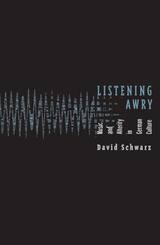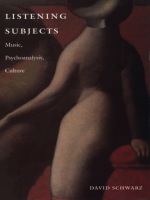2 books about Schwarz, David

Listening Awry
Music And Alterity In German Culture
David Schwarz
University of Minnesota Press, 2006
In his first book, Listening Subjects, David Schwarz succeeded in fusing post-Lacanian psychoanalytic, musical-theoretical, and musical-historical perspectives. In Listening Awry, he expands his project to “tell a story of historical modernism writ large”—how German music spanning two centuries refracts changes in society and culture, as well as the impacts of concepts introduced by psychoanalysis.Schwarz shows how post-Lacanian psychoanalysis can be applied to ideological interpellation that connects psychoanalysis to culture and how music theory can ground these considerations in precise details of musical textuality. He “listens awry” in several ways: by understanding musical meaning in both objective and socially structured ways, by embracing historical and also aesthetic approaches, by addressing high art as well as popular music, and by listening “around” conventional forms of musical meaning to reach toward that which evades signification.Structured around four themes—trauma, the other/Other, the look/gaze binary, and Judaism—Listening Awry explores five key moments in post-Enlightenment music: the rise of the singular orchestral conductor and the emergence of a new form of alterity, the Art Song and “the sublime of the delicate” (a correlate of the Kantian mathematical and dynamical sublime), the birth of psychoanalysis and the twentieth-century turn toward atonality, German war songs and the subversion of German music by the Nazis, and two different versions of Wagner’s Parsifal that were performed one hundred years apart and in radically different contexts.This highly original work, filled with imaginative readings and disquieting observations, links trauma with the culture and history of modernity and German music, deftly tying the experience of the body to the sounds it hears: how it reaches us slowly, penetrates the skin, and resonates.David Schwarz is assistant professor of music at the University of North Texas. He is the author of Listening Subjects: Music, Psychoanalysis, Culture.
[more]

Listening Subjects
Music, Psychoanalysis, Culture
David Schwarz
Duke University Press, 1997
In Listening Subjects, David Schwarz uses psychoanalytic techniques to probe the visceral experiences of music listeners. Using classical, popular, and avant-garde music as texts, Schwarz addresses intriguing questions: why do bodies develop goose bumps when listening to music and why does music sound so good when heard "all around?" By concentrating on music as cultural artifact, Listening Subjects shows how the historical conditions under which music is created affect the listening experience.
Schwarz applies the ideas of post-Lacanian psychoanalytic theorists Slavoj Zizek, Julia Kristeva, and Kaja Silverman to an analysis of diverse works. In a discussion of John Adams’s opera Nixon in China, he presents music listening as a fantasy of being enclosed in a second skin of enveloping sound. He looks at the song cycles of Franz Schubert as an examination and expression of epistemological doubts at the advent of modernism, and traverses fantasy "space" in his exploration of the white noise at the end of the Beatles’ "I Want You (She’s So Heavy)." Schwarz also considers the psychosexual undercurrent in Peter Gabriel’s "Intruder" and the textual and ideological structures of German Oi Musik. Concluding with a reading of two compositions by Diamanda Galás, he reveals how some performances can simultaneously produce terror and awe, abjection and rage, pleasure and displeasure. This multilayered study transcends other interventions in the field of musicology, particularly in its groundbreaking application of literary theory to popular and classical music.
Schwarz applies the ideas of post-Lacanian psychoanalytic theorists Slavoj Zizek, Julia Kristeva, and Kaja Silverman to an analysis of diverse works. In a discussion of John Adams’s opera Nixon in China, he presents music listening as a fantasy of being enclosed in a second skin of enveloping sound. He looks at the song cycles of Franz Schubert as an examination and expression of epistemological doubts at the advent of modernism, and traverses fantasy "space" in his exploration of the white noise at the end of the Beatles’ "I Want You (She’s So Heavy)." Schwarz also considers the psychosexual undercurrent in Peter Gabriel’s "Intruder" and the textual and ideological structures of German Oi Musik. Concluding with a reading of two compositions by Diamanda Galás, he reveals how some performances can simultaneously produce terror and awe, abjection and rage, pleasure and displeasure. This multilayered study transcends other interventions in the field of musicology, particularly in its groundbreaking application of literary theory to popular and classical music.
[more]
READERS
Browse our collection.
PUBLISHERS
See BiblioVault's publisher services.
STUDENT SERVICES
Files for college accessibility offices.
UChicago Accessibility Resources
home | accessibility | search | about | contact us
BiblioVault ® 2001 - 2025
The University of Chicago Press









